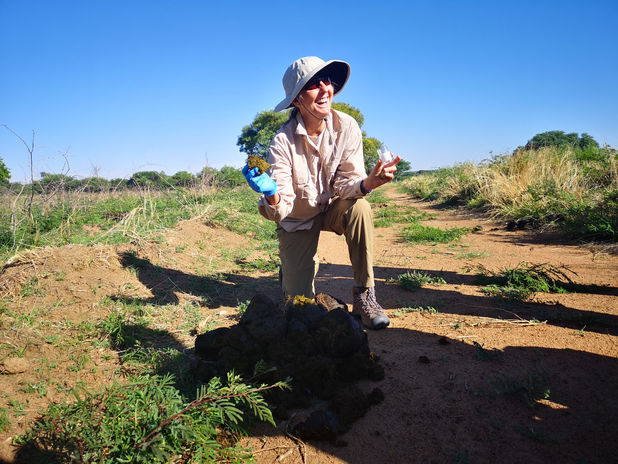EARTHWATCH
The Earthwatch Institute has collaborated with Mankwe Wildlife Reserve since 2004, conducting numerous research projects in relation to the Conservation of Endangered Species in South Africa. The project has covered a range of species:
-
Cape Vulture
-
White Back Vulture
-
Black Backed Jackal
-
Brown Hyaena
-
Southern White Rhino
The research conducted onsite has contributed to numerous publications, which has had significant effect on reserve management within South Africa. The Earthwatch Institute has a key focus on citizen scientists, sending eight groups of volunteers out to the site every year to help conduct ground breaking research. This work contributes to the survival of threatened species.
One of the roles of Earthwatch is to enable citizen scientists to get first-hand knowledge and experience into the conservation work occurring on the front line. Improving education on wildlife management techniques and the threats associated with threatened species within the South African savannah.
The current focus of the project is looking at the impacts of dehorning on the southern white rhino and the role the rhino plays in the savannah ecosystem. As part of this project volunteers have the opportunity to work with leading conservationists and scientists. Whilst collecting data, they have the freedom to walk the African savanna and observe the abundant wildlife.
Numerous publications have come from both the current rhino project and previous studies with scavengers, which are listed below:
-
Penny S., 2019. The impact of dehorning on the white rhinoceros (Ceratotherium simum) and the evaluation of novel anti-poaching tactics. (Doctoral thesis. University of Brighton)
-
Penny, S.G., White, R.L., Scott, D.M., MacTavish, L. and Pernetta, A.P., 2019. Using drones and sirens to elicit avoidance behaviour in white rhinoceros as an anti-poaching tactic. Proceedings of the Royal Society B, 286(1907), p.20191135.
-
Walkden, N., 2019. Attitudes toward vertebrate scavengers in South Africa's North-West and Gauteng provinces (Doctoral dissertation, University of Brighton).
-
James, R.S., Scott, D.M., Yarnell, R.W. and Overall, A.D.J., 2017. Food availability and population structure: How do clumped and abundant sources of carrion affect the genetic diversity of the black‐backed jackal?. Journal of Zoology, 301(3), pp.184-192.
-
Phipps, L.W., Diekmann, M., MacTavish, L.M., Mendelsohn, J.M., Naidoo, V., Wolter, K., and Yarnell, R.W., 2017. Due South: A first assessment of the potential impacts of climate change on Cape vulture occurrence. Biological Conservation. 210:16-25.
-
Phipps, W.L., 2015. Identifying drivers of Cape vulture (Gyps coprotheres) space use in southern Africa (Doctoral dissertation, Nottingham Trent University).
-
Yarnell, R.W., Phipps, W.L., Dell, S., MacTavish, L.M. and Scott, D.M., 2015. Evidence that vulture restaurants increase the local abundance of mammalian carnivores in South Africa. African journal of ecology, 53(3), pp.287-294.
-
James, R., 2014. The population dynamics of the black-backed jackal (Canis mesomelas) in game farm ecosystems of South Africa (Doctoral dissertation, University of Brighton).
-
Phipps, W.L., Wolter, K., Michael, M.D., MacTavish, L.M. and Yarnell, R.W., 2013. Do power lines and protected areas present a catch-22 situation for cape vultures (Gyps coprotheres)?. PLoS One, 8(10), p.e76794.
-
Yarnell, R.W., Phipps, W.L., Burgess, L.P., Ellis, J.A., Harrison, S.W., Dell, S., MacTavish, D., MacTavish, L.M. and Scott, D.M., 2013. The influence of large predators on the feeding ecology of two African mesocarnivores: the black-backed jackal and the brown hyaena. African Journal of Wildlife Research, 43(2), pp.155-166.
-
Yarnell, R.W. and MacTavish, L., 2013. A novel record of aardwolf Proteles cristata feeding behaviour. Transactions of the Royal Society of South Africa, 68(1), pp.81-82.
-
Phipps, W.L., 2012. Spatial patterns of land-use by Immature African white-backed vultures (Gyps africanus) captured in the North-West Province, South Africa (Masters dissertation, University of Pretoria).
-
Scott, Rott, James, Thorn, Yarnell, Richmond-Coggan, MacTavish and Phipps, 2011. Recycling services provided by South Africa’s scavengers. In Landscape Ecology and Ecosystem Services. C. Young Eds





















